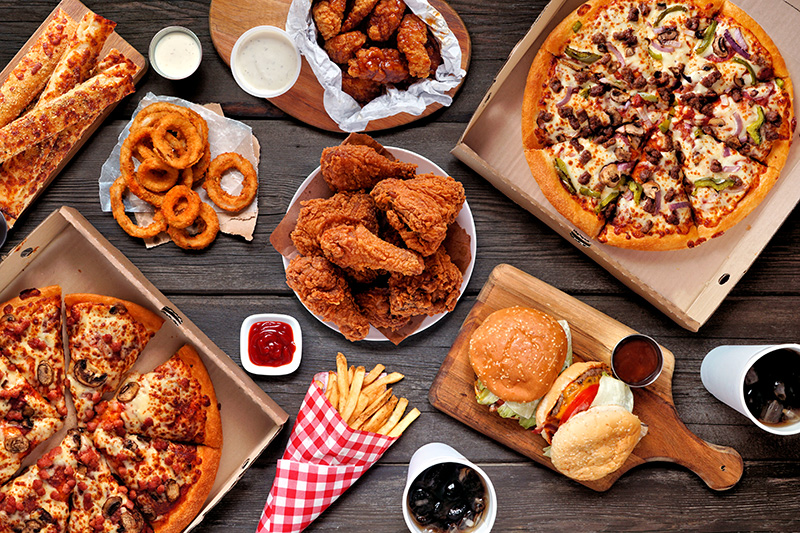More Health and Nutrition Bites
Related
Hidden Valley Ranch and Highly Processed Food
Three words that are a staple of American cupboards because the folks at Hidden Valley Ranch were the originators of Ranch Dressing. The history is pretty well known to foodies: Steve Henson and his wife offered the dressing at their dude ranch in Santa Barbara, the Hidden Valley Ranch.
Eggs Aren't A Problem
At almost every talk I give eggs come up in the discussion. Back in the 1970's and 80's eggs got a really bad rap - and not for very substantial reasons.
What Not To Eat: Processed Foods Edition
We review convenience meals on the Dr. Gourmet web site. While I am not a fan of them, I do realize that folks are busy and challenged for time, so we try to look for the better choices to help you out. Most of the ones that we choose to put to the tasting panel come out of the freezer case, and there's a reason for that.
Health & Nutrition Bites
Get the latest health and diet news - along with what you can do about it - sent to your Inbox once a week. Get Dr. Gourmet's Health and Nutrition Bites sent to you via email. Sign up now!
Women more at risk from highly-processed foods

If you're reading this article it's unlikely to be news to you that processed foods not only help you gain weight as well as contributing to your risk of colon and rectal cancers, but they also help you age faster on a cellular level.
Okay, processed foods aren't good for your waistline, but what about your heart? While we could draw a line between eating processed foods, being overweight, and thus being at greater risk of heart disease, that's not the same as saying that processed foods are bad for your heart. Remember, in medicine the Transitive Property of Equality (if A = B and B = C then A = C) doesn't necessarily apply.
A team of scientists utilized data gathered for the Prostate, Lung, Colorectal, and Ovarian Cancer Screening Trial, which was originally designed to investigate whether regular screenings could reduce the risk of death from these cancers (Int J Beh Nutr Phys Act 2021;18:21). This study recruited participants between the ages of 55 and 74 from ten cities around the United States. Participants were recruited from 1993 to 2001 and the study ended in 2015. For this research the analysis included nearly 92,000 people.
At the start of the study participants responded to demographic and dietary questionnaires, which allowed the researchers to assess the amount of processed foods the participants consumed. For this analysis the authors utilized the NOVA food classification system, which groups foods into four levels of processing: "unprocessed or minimally processed foods, processed culinary ingredients, processed foods, and ultra-processed foods."
The authors state,
In the present study, we focused on ultra-processed foods, which include sour cream, cream cheese, ice cream, frozen yogurt, fried foods, breads, cookies, cakes, pastries, salty snacks, breakfast cereals, instant noodles and soups, sauces, margarine, candy, soft drinks, fruit drinks, restaurant/industrial hamburgers, hot dogs, and pizza.
The participants' level of consumption was stratified into five levels of intake, and the processed food consumption levels of those who died of cardiovascular disease, heart disease, and cerebrovascular disease was compared with those who either died of a different cause or did not die at all.
After taking into account demographic factors such as age, sex, and race, the authors also controlled for a history of chronic disease (such as high blood pressure or diabetes), Body Mass Index, smoking or alcohol use, physical activity and total daily calories consumed.
Compared to those who consumed the least highly-processed foods, those who consumed the most were 50% more likely to die of cardiovascular disease and 68% more likely to die of heart disease. Cerebrovascular disease was not significantly associated with highly-processed food consumption.
That's frightening enough, but when the authors looked at men and women separately, they found that while men were 23% more likely to die of cardiovascular disease and 39% more likely to die of heart disease, the risk was much higher for women: Their risk of death from cardiovascular disease jumped by 93% and more than doubled for heart disease - 217%.
Which foods were the most commonly-consumed ultra-processed foods? The top two were breakfast cereals (accounting for about 34% of all processed foods), with soft drinks following at just over 15% of all processed foods.
What of those who didn't die of cardiovascular disease or heart disease? The researchers found that those who consumed the highest levels of ultra-processed foods were 20% more likely to die of any cause than those who consumed the least.
What this means for you
Yet another reason to pass up the foods that come in boxes.
I find it interesting that the most commonly-consumed ultra-processed food wasn't soft drinks but cereals. Making toast and spreading a little peanut butter on it literally takes just a couple of minutes, but if you must have cereal instead of making breakfast, choose ones with the highest amount of fiber, the lowest amount of added sugars, and the fewest ingredients.
First posted: March 31, 2021

